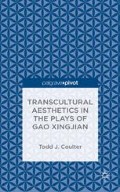Abstract
The conclusion takes up the deeper political and cultural implications of Gao’s work. What drew me to Gao originally was what I interpreted as stubborn resistance to established norms and an unwillingness to be defined. Considering the totality of his acknowledged cultural heritage and aesthetic project, I argue that Gao manifests a transcultural sensibility of identity expressed through the unique aesthetics of his dramaturgy. This aesthetics is predicated on a playful manipulation of established theatrical discourses that allows one to exist always at the periphery and never in the center. This playfulness necessitates constant creation, and it is here that Gao most happily resides.
Access this chapter
Tax calculation will be finalised at checkout
Purchases are for personal use only
Preview
Unable to display preview. Download preview PDF.
Notes
Gao Xingjian, “La raison d’être de la littérature,” in Le Témoinage de la littérature (Paris: Seuil, 2004) 115.
Jean-Paul Sartre, “A Plea for Intellectuals.” Between Marxism and Existentialism, translated by Jonathan Matthews (New York: Pantheon, 1974), 246.
Edward Said, Representations of the Intellectual (New York: Vintage, 1994), 53.
Erika E. S. Evasdottir, Obedient Autonomy: Chinese Intellectuals and the Achievement of Orderly Life (Honolulu: University of Hawai’I Press, 2005), ix.
Rana Mitter, A Bitter Revolution (Oxford: Oxford University Press, 2004), 276–277.
Author information
Authors and Affiliations
Copyright information
© 2014 Todd J. Coulter
About this chapter
Cite this chapter
Coulter, T.J. (2014). Conclusion: The Obligation of Creation. In: Transcultural Aesthetics in the Plays of Gao Xingjian. Palgrave Macmillan, New York. https://doi.org/10.1057/9781137440747_8
Download citation
DOI: https://doi.org/10.1057/9781137440747_8
Publisher Name: Palgrave Macmillan, New York
Print ISBN: 978-1-349-49510-8
Online ISBN: 978-1-137-44074-7
eBook Packages: Palgrave Theatre & Performance CollectionLiterature, Cultural and Media Studies (R0)

